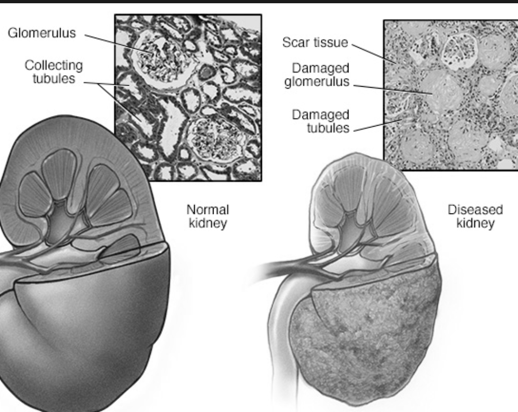Two recent studies, one from Britain and one from Japan, report a correlation between obesity and chronic kidney disease (CKD). The British report is accompanied by an editorial comment that more than a billion people worldwide suffer from overweight and obesity. There has been a sharp rise in both obesity and CKD in recent years. A direct causality link has not been established, but appears highly likely, according to the British authors.
Chronic kidney disease includes structural and functional changes that reduce the ability of the kidneys to filter the blood. It is defined as a glomerular filtration rate of less than 60 ml/min for the standard kidney filtration area of 1.73 square meters. CKD generally progresses slowly, as the glomerular filtration rate decreases toward zero. Diet and medication can maintain kidney function at an acceptable level for many patients. However, when kidney function drops too low, dialysis or transplant therapy is necessary. This is called end stage renal disease (ESRD). Chronic kidney disease is also a major cause of cardiovascular disease.
High blood pressure, diabetes, and unhealthy blood lipids are also associated with both obesity and CKD, so it has not been clear whether obesity by itself is a risk factor. The Japanese study used a statistical analysis that indicated high body mass index is indeed associated with CKD independently of these other factors.
The British researchers explain that “excess fat stores are an active production site of various inflammatory cytokines, responsible for enhanced levels of inflammation and oxidative stress with detrimental renal effects” (Ref. 1). The inflammation connection was also noted by researchers at Case Western Reserve University, who found an association between periodontal (gum) disease and CKD.
Once chronic kidney disease develops, from whatever cause, obesity appears to accelerate the course of the disease. Studies quoted by the British paper show that CKD progresses to end stage renal disease more quickly in patients with higher body mass index.
Simple blood and urine tests can detect CKD in its early stages, when treatment is most effective. Weight reduction appears to have great potential to slow or stop the progression of this serious disease.
by Linda Fugate, Ph.D.
References:
1. Ting SMS et al, “Overweight, obesity and chronic kidney disease”, Nephron Clin Pract 2009;112:c121-127.
2. Nomura I et al, “Association between body mass index and chronic kidney disease: A population-based, cross-sectional study of a Japanese community”, Vascular Health and Risk Management 2009; 5: 315-320.
3. https://www.empowher.com/news/herarticle/2009/09/02/top-ten-risk-factors-chronic-kidney-disease




Add a Comment1 Comments
Hi Linda - This is valuable information, especially as we continue to see the numbers of obese children continue to rise, and more children becoming obese at earlier ages. While diabetes is often mentioned as a potential risk for the obese, I've not seen a lot of counsel about the correlation between obesity and chronic kidney disease. Thanks for this helpful information!
October 29, 2009 - 6:41pmBest,
Pat
This Comment